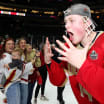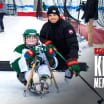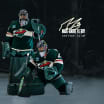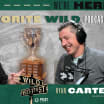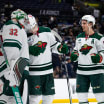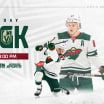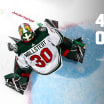Bruce Bites: Training Camp Edition
Wild coach talks about his offseason and a new-look defensive structure
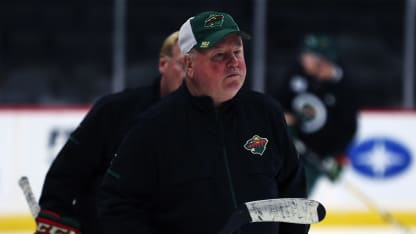
© Katlyn Gambill
Dan Myers: Other than the summer camp you and your family have back in the Toronto area, what do you like to do during the offseason?
Bruce Boudreau: Well, I didn't do much this year because I had knee surgery. My wife hated me, because I was five weeks at home doing nothing. But for the most part, other than the hockey school, the main thing I like to do is go around and see my kids. I got a chance to do that; I went to Ottawa to visit my daughter, had (Boudrea's middle son) Andy come down here, I went to Fort Wayne, Indiana, to help (oldest son and Fort Wayne Komets assistant) Ben move in there. Those things are cool. And I visited my mother for a couple of weeks in there. Once I'm in Ontario, I have my boyhood friends that I try to hook up with for golf and stuff. It's a lot different than when we were 25 years old, but we get out there and have a laugh about all the stupid stuff we did when we were kids.
DM: When does the itch to start coming back to the rink start for you?
BB: When we're doing the
hockey school
, the first week of August, I usually call that hockey season. Because once that's done, I get [back to Minnesota] and I go to the office every day. That's when it starts for me. You try to let it go in June and July, but I can't let it go. I'm always re-hashing the year we just went through over and over again, all the things you can do better. It's pretty well hockey 12 months out of the year for me.
DM: Training camp seems like it can get a little lengthy at times. Is it too long in your eyes? Would you like to jump into the season sooner?
BB: It's a dual thing. You'd like to get down to your team as quick as possible, your group. We don't have a lot of different lineup combinations right now, but it is really interesting to see the new guys and see the young guys and watch them develop from year to year. You're hoping they get better and better, so it's a double-edged sword. You want to get to your team; it's hard to sit there in an exhibition game and really not get concerned whether you win or lose. That's always bugged me because I want to win every game. When we lose a preseason game, I'm still not in a good mood. But to get the team together, get them clicking, and watch a really good practice, when they work hard for whatever length of time we're out there, it's really exciting when you come off the ice.
DM: You weren't given much back during your playing days. What are you looking for from guys who are more your fringe players? The guys who are fighting just to make your team or be one of the first call-ups during the season?
BB: I think the thing you look for most is, not accepting the fact that you may not make the team. If you come to camp thinking you're not going to make it, then you give up a little quicker. But if you get to camp and, whether you make it or not, you're just giving it all you've got, you're gonna get rewarded somewhere down the road, whether it's the 10-game mark or the 40-game mark. Coaches remember it and they will reward the guys on the effort they give.
DM: You've talked through camp about some structural changes you have made in the defensive zone. In layman's terms, what were you trying to accomplish last year and how have you changed it? Why did you feel a change was needed?
BB: The biggest thing is the structure of our neutral zone. We've got great mobility on the back end and we want to use that. We don't want to sag back and let an opponent get the puck deep, because the big teams will keep pressuring and use their size to wear us down. We may not have a ton of size, but we have the mobility. If we can stop an opponent before they get across the blue line and force turnovers, I think we'll be so much better. In training camp, we've tried it and it's getting better every day. For an opponent, it's very difficult to get through it when you do it right. The less we can play in our zone and the more our goalies can handle the puck in a proper way and get us out of trouble, we won't allow many shots. We don't want opponents coming through our zone in droves of three. That's what we're trying to avoid.
DM: Can that translate to the offensive end as well?
BB: If we can force turnovers and we're ready to go in transition, then yeah, it'll go well and we'll get a lot of offensive chances. That's what we want to look forward to because I think we have tremendous balance on this team. We may not have the superstar that everyone wants to talk about all the time, but we have at least 12 really good forwards who can score 10 goals or more per year. You get 12 forwards scoring at least 10 goals, you're doing really well.

